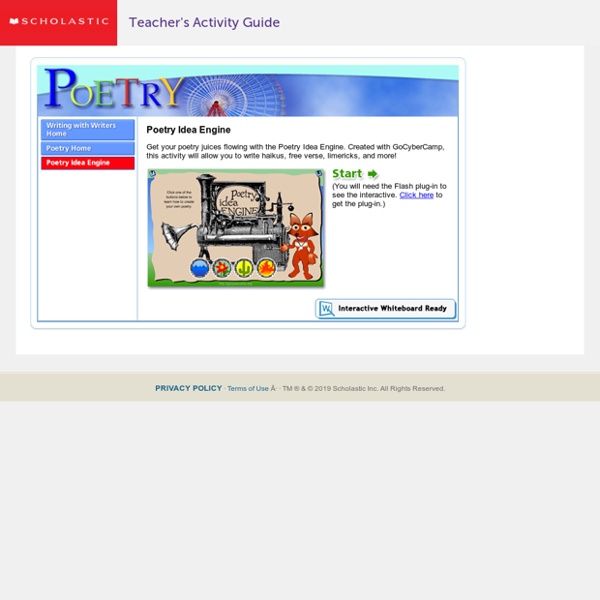Poetry Foundation
Often used in political speeches and occasionally in prose and poetry, anaphora is the repetition of a word or words at the beginning of successive phrases, clauses, or lines to create a sonic effect. Dr. Martin Luther King Jr.’s famous “I Have a Dream” speech, which uses anaphora not only in its oft-quoted “I have a dream” refrain but throughout, as in this passage when he repeats the phrase “go back to”:
Poetry with Kids - Ideas and Resources
Poetry with Kids - Ideas and Resources by Susan Stephenson, www.thebookchook.com My feelings about poetry are actually quite difficult to express. Poetry is many different things to me: perhaps it’s a succinct way of saying something profound, a sly dig at a pompous personage, or a rollicking tale to make me laugh. One of the things I believe about poetry is exactly expressed in the quote below. Another is that if we want kids to love poetry (and we should!)
Commonsense
Commonsense ♠♣ © winnie caw 2002(follow the arrows below for more of winnie caw's whimsy, or click on a link)Puns, More Puns and Jokes Home Page Reflections Search Engine - find anything on whimsy pages
Poems & Questions for National Poetry Month
Skip to main content <div id="nojs-warning">WARNING: Javascript must be enabled for the correct page display</div> Sign InRegister ReadWorks.org
How to Memorize a Poem
Has memory has become a vestigial organ like the appendix? The battle over writ/spoke, poem working on page or stage, rages. Let’s breathe hot oxygen on the conflagration with this, Step-by-Step-by-Heart. Difficulty: Easy
REVEALED: Hundreds of words to avoid using online if you don't want the government spying on you
Department of Homeland Security forced to release list following freedom of information requestAgency insists it only looks for evidence of genuine threats to the U.S. and not for signs of general dissent By Daniel Miller Published: 09:32 GMT, 26 May 2012 | Updated: 17:46 GMT, 26 May 2012
What makes a poem … a poem? - Melissa Kovacs
The first poems were read aloud. Their regular patterns aided memorization of genealogy, oral history, and law. The performance aspect of poetry has never disappeared; Robert Frost toured the country and earned a living mainly through poetry readings. In 2012, there were 7,427 poetry readings in April, National Poetry Month.
Learning Recitation
How to Use This Video This "Learning Recitation" video was created to illustrate the art of poetry recitation for Poetry Out Loud: National Recitation Contest. Along with the Teacher’s Guide, Audio Guide, and Judge’s Guide, use the video and companion guide to foster classroom discussion. Students can watch these National Final recitations and evaluate the strengths (and weaknesses!) of each, according to Poetry Out Loud evaluation criteria.
I, Too, Sing America
Patriotism's a pretty complicated concept. It can mean standing up for your country or criticizing it. If you want to sum up patriotism, you can simply call it "love for one's country." But how does one love a country?
O Frabjous Day! Neil Gaiman Recites Lewis Carroll's "Jabberwocky" from Memory
When the young Neil Gaiman was learning Lewis Carroll’s “Jabberwocky” by heart, he surely had no inkling that years later he’d be called upon to recite it for legions of adoring fans…particularly on the Internet, a phenomenon the budding author may well have imagined, if not technically implemented. Worldbuilders, a fundraising portal that rewards donors not with tote bags or umbrellas, but rather with celebrity challenges of a non-ice bucket variety, scored big when Gaiman agreed to participate. Earlier this year, a rumpled looking Gaiman read Dr. Seuss’s “rather wonderful” Green Eggs and Ham into his webcam. This month, with donations to Heifer International exceeding $600,000, he found himself on the hook to read another piece of the donors’ choosing.
24 Must-Share Poems for Middle School and High School
It can be hard to know which poems will spur your middle and high schoolers into deep, meaningful discussion and which will leave them, ahem, yawning. So we asked experienced teachers to share their favorites—the punch-in-the-gut poems that always get a reaction, even from teens. Here’s what they had to say about the best poems for middle school and high school students. 1.
BlackOutPoetry
During the last lessons this semester, we are going to be creative! Have you heard about Black Out Poetry before? What is Black Out Poetry? Blackout poetry focuses on rearranging words to create a different meaning. Also known as newspaper blackout poetry, the author uses a permanent marker to cross out or eliminate whatever words or images he sees as unnecessary or irrelevant to the effect he's seeking to create.


